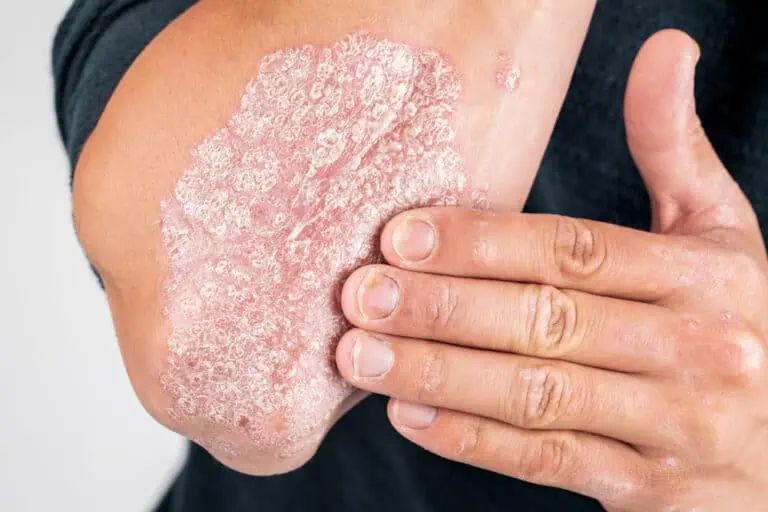7 Psoriasis Self-Care Tips to Soften and Soothe Psoriasis Plaques

If you have plaque psoriasis, the best treatment is the plan your dermatologist recommends, which may include topical medicines, oral medicines and even light or laser therapy. The dermatologist can finetune the plan based on what’s working and address concerns such as worsening plaques or signs of psoriatic arthritis. But there’s plenty of psoriasis self-care strategies you can follow to help minimize scaly skin patches, calm the irksome psoriasis itch and fend off psoriasis flare-ups.
Below are seven dermatologist-approved tips to help you manage psoriasis at home.
1. Reboot your showers and baths
Long, hot showers and baths can be your skin’s worst enemy. They rob it of moisture and leave it more vulnerable to flare-ups. Try this routine instead:
- Turn the tap to warm (not hot).
- Use an unscented, non-soap cleanser or body wash. Steer clear of deodorant soaps, which tend to be too harsh.
- Lather up with your hands, not a washcloth or loofah. Any kind of manual exfoliation can make psoriasis worse.
- Limit showers to five minutes and baths to 15 minutes.
- Rinse off thoroughly and blot your skin gently with a clean towel until you are damp, not dry.
- Immediately apply a thick cream or an ointment to seal in moisture. Some moisturizers, such as Curél Hydra Therapy Wet Skin Moisturizer, are designed to be used on wet skin.
2. Use a psoriasis cream regularly
Moisturizing often to skin hydrated is an essential psoriasis self-care strategy. A thick, fragrance-free cream is the best psoriasis moisturizer. But you may want more than a simple moisturizer. Psoriasis creams go a step further: They contain one or more moisturizers as well as ingredients designed to smooth the skin and reduce flaking, redness and scaling.
Many of the best creams for psoriasis contain salicylic acid, a beta-hydroxy acid that exfoliates the dead skin cells that form psoriasis plaques. Salicylic acid also calms inflammation and itching and makes it easier for topical medications to penetrate the skin.
Choose a product that’s unscented or fragrance free, since added fragrance can irritate the skin and trigger flares. Products labeled “gentle” or “for sensitive skin” are free of chemicals and dyes that might make psoriasis worse.
The National Psoriasis Foundation maintains a list of recommended psoriasis self-care products, including psoriasis creams. Check their product directory, or look for the National Psoriasis Foundation Seal of Recognition when you shop. Among the creams they recommend are:
- CeraVe Psoriasis Moisturizing Cream
- Dermarest Psoriasis Medicated Treatment Gel
- Gold Bond Psoriasis Relief Multi-Symptom Cream
- MG217 Medicated Moisturizing Psoriasis Cream
Keep in mind that creams and ointments (including petroleum jelly) tend to be thicker than lotions and better at locking in moisture. That said, they may also be greasier. You may want to use a cream or ointment at night and after your shower and a lotion when you don’t have time to let a cream sink in.
3. Stop yourself from picking or scratching
As tempting as it may be to pick at scaly skin patches, peeling off flakes before they fall off naturally can make psoriasis worse. Damaging the healthy skin next to psoriasis plaques, even slightly, can inflame it and cause new scales to form. Even absentmindedly scratching can damage the skin, so keep your fingernails short.
If the plaques itch, keeping them moisturized should help. Applying a cold compress can also ease a bout of itching. A washcloth soaked in cold water will do the trick.
4. Switch laundry detergents
If you aren’t already using a laundry detergent that’s free of fragrance, dyes and chlorine and designed for sensitive skin, try switching to one.
5. Hydrate your home
Dry air is thirsty air: It will sap moisture from wherever it can, including your skin. Add moisture to the air by running a humidifier in the room you spend most of your time in, especially in the winter, when home heating systems leave air especially dry. If you can afford to splurge on a higher-end product, consider buying a humidifier that’s also an air purifier.
6. Explore natural remedies for psoriasis
Your kitchen cabinet or pantry may contain a home remedy or two that could be effective for you. Among the natural remedies for psoriasis that show promise are these.
Turmeric
Psoriasis is driven by inflammation, and the active ingredient in this colorful spice, called curcumin, has been shown to ease inflammation when applied to skin as part of a topical psoriasis treatment. Consult your dermatologist if you’re interested in trying it. Turmeric supplements have also been found to tamp down inflammation. Talk to a registered dietitian about a dose that’s appropriate for you.
Epsom salts
Using Epsom salts or salts from the Dead Sea as a bath soak has been found to help ease inflammation and itching from psoriasis. This may be due in part to the anti-inflammatory effects of the salt’s magnesium. (Regular table salt has no magnesium.) To find out if a salty soak helps your psoriasis, run a tub of warm water, add the amount of Epsom salts or Dead Sea salts recommended on the package or by your dermatologist (likely around 2 cups per gallon of water) and soak for no more than 15 minutes.
Colloidal oatmeal
Oats ground to a fine powder also make for a soothing soak. You can buy a colloidal oatmeal bath soak or make your own by grinding regular oats in a food processor, coffee grinder or spice grinder. Follow the directions on the package or ask your dermatologist how much homemade colloidal oats to use.
7. Address stress
Stress and anxiety can make psoriasis worse. In fact, a review of multiple studies found that 31% to 88% of people with psoriasis said stress triggered flares.
If your psoriasis flares when you’re under pressure or feeling down, prioritize daily physical and mental breaks.
- Start a yoga, meditation, deep breathing or journaling practice.
- Get outside to walk, bike ride or enjoy a dose of fresh air and sunshine. Talk to your dermatologist about how much unprotected sun exposure, if any, is right for you. Small doses of sunlight may help some people with psoriasis, but if you’re taking a medication that makes your skin more sensitive to the sun, it’s a bad idea.
- Take up a relaxing hobby, whether it’s gardening, knitting, drawing or playing an instrument.
If you need help managing stress and anxiety, consider therapy or counseling. As with many chronic conditions, it sometimes takes a village of experts to tame psoriasis, and adding a mental health practitioner to your psoriasis care team could be a game changer.
Medically reviewed by Lucy L. Chen, MD
Written by Maura Rhodes, a writer and editor specializing in health and well-being.


